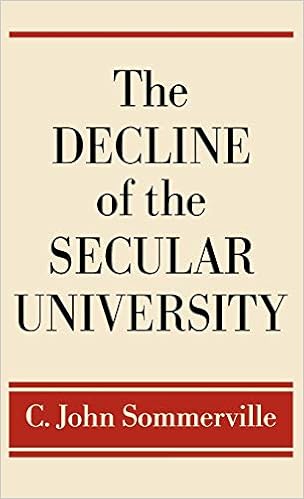By: John Sommerville (Oxford: Oxford University Press, 2006)

Summary:
Are American universities equipped to answer life’s big questions? Not in their present state, historian C. John Sommerville argues. Tracing a line from the Middle Ages, when theology was “queen of the sciences,” up to twenty-first century, where religion is systematically being eliminated from academic life, Sommerville raises a lament, “We used to talk about truth, but now we talk about tolerance.” Truth has been sidelined for secularism. Sommerville compares secularization, the separating of religion from life and thought, with secularism, an ideology that enforces secularization by marginalizing religion. The former is a dogmatic imposition of the latter, where a “secularist uniformity” is touted as neutrality.
The mistake was even attempting a secular university. Now, the university avoids the most important questions while answering ones about which the general public cares little. This lack of relevance leads Sommerville to see secularism as “more and more like a stage within history, rather than its final goal.” The evidence of this is that college curriculum focuses on job skills rather than cultural appreciation. In the humanities universities are more likely to criticize than appreciate culture, to challenge culture rather than promote a common one.
Themes:
- Human Values. Ideas such as evil, justice, truth, and welfare become impossible to justify, describe, or quantify the more naturalism is promoted.
- Tolerance. The highest ideal of “hyperliberals” is tolerance, for which they proselytize, while they also proselytize that proselytizing is intolerant. Tolerance should allow for anyone’s
- Childish Religion. Rather than prematurely labeling religion as childish and demanding that college students abandon it, the academy should encourage religious observance and consideration.
- Judgment. Everyone has religion, and the basis for which we judge other religions is itself our religion. Consider the greatest atrocities in Christian history—the Crusades, the Inquisition, slavery, opposition to science—but also how their eventual condemnation came from an application of genuine Christian values.
- Pillars of Secularism. To trace the “narrative of [secularism’s] institutional development,” one can look to four pillars: the courts, periodical media, public schools, and secular universities.
Discussion Questions:
- “The academy needs to learn to speak theologically.” How? Is Sommerville’s book more description than prescription?
- “American society might have more intellectual substance, if children did not have to wait so long to be challenged to think.” In what ways and where do you see children being discouraged from thinking deeply?
- Universities love the idea of honor. “An ethical system based in honor is a self-regarding ethic, while one based in charity is an other-regarding ethic.” Do you agree? How do you see this?
- What is the difference in the terms religion and spiritually, and how are those applied in our culture?
- What point is he making with the example of eating human flesh?
- How are Christian Study Centers, mentioned in Chapter 10, part of the solution?
Drew Trotter